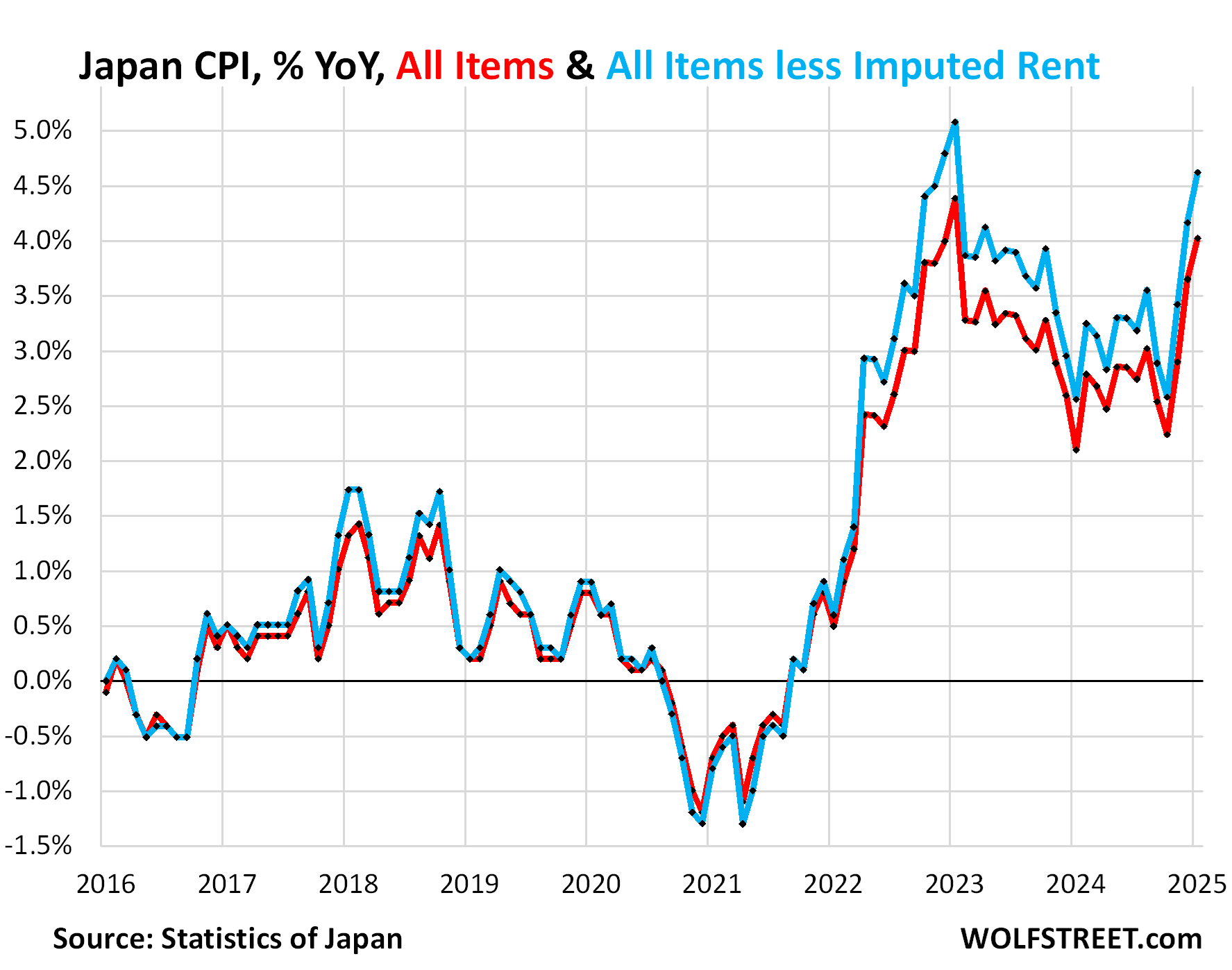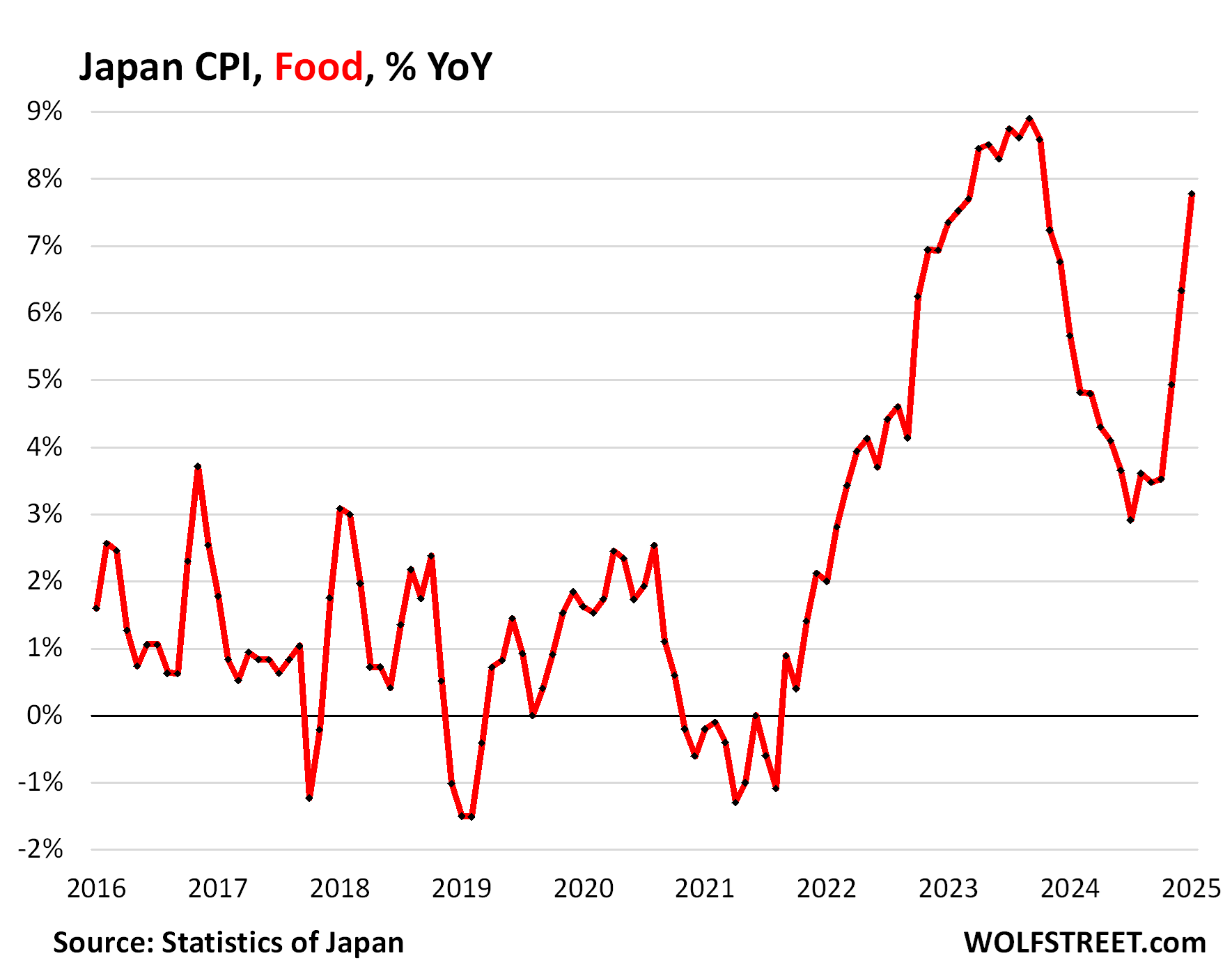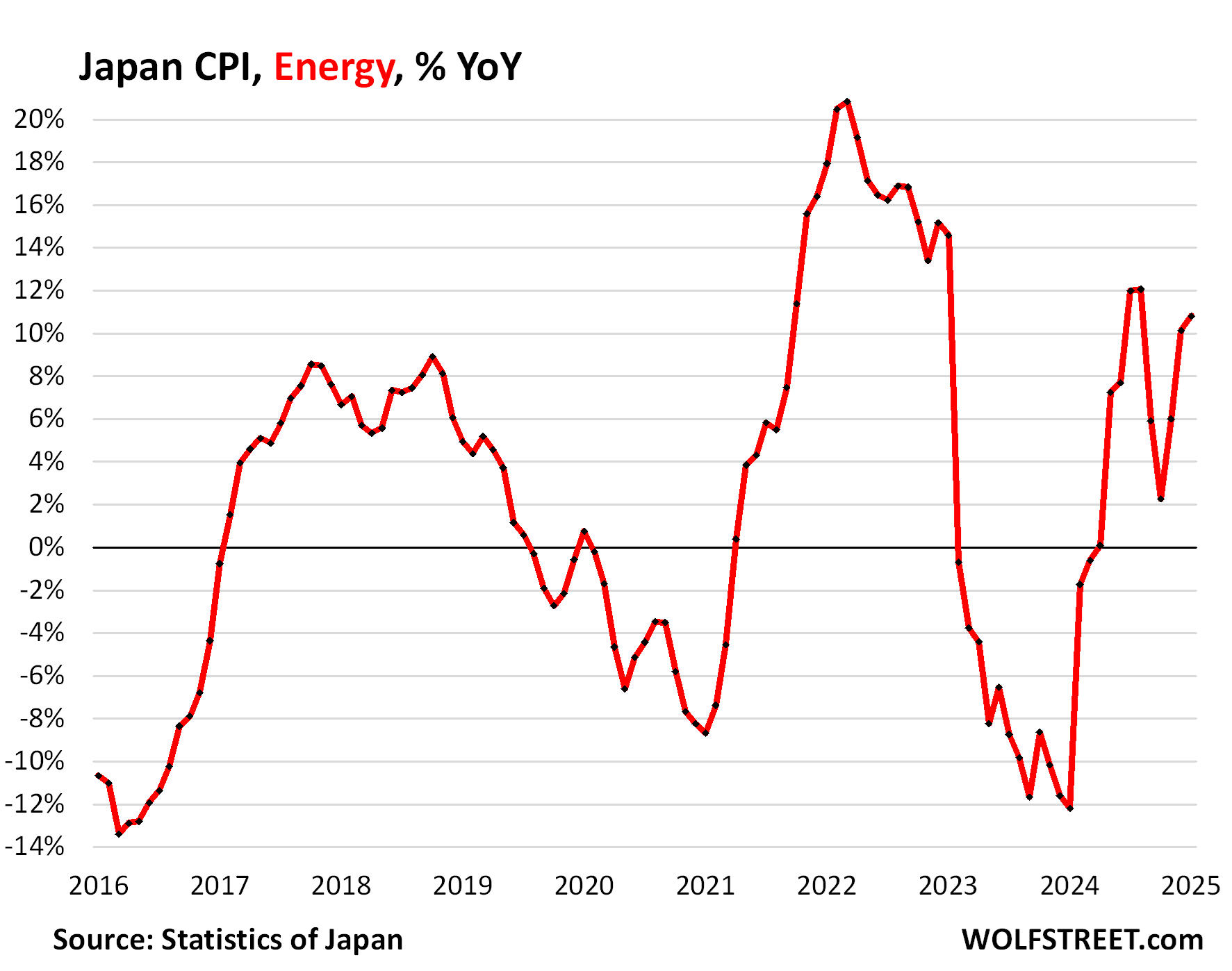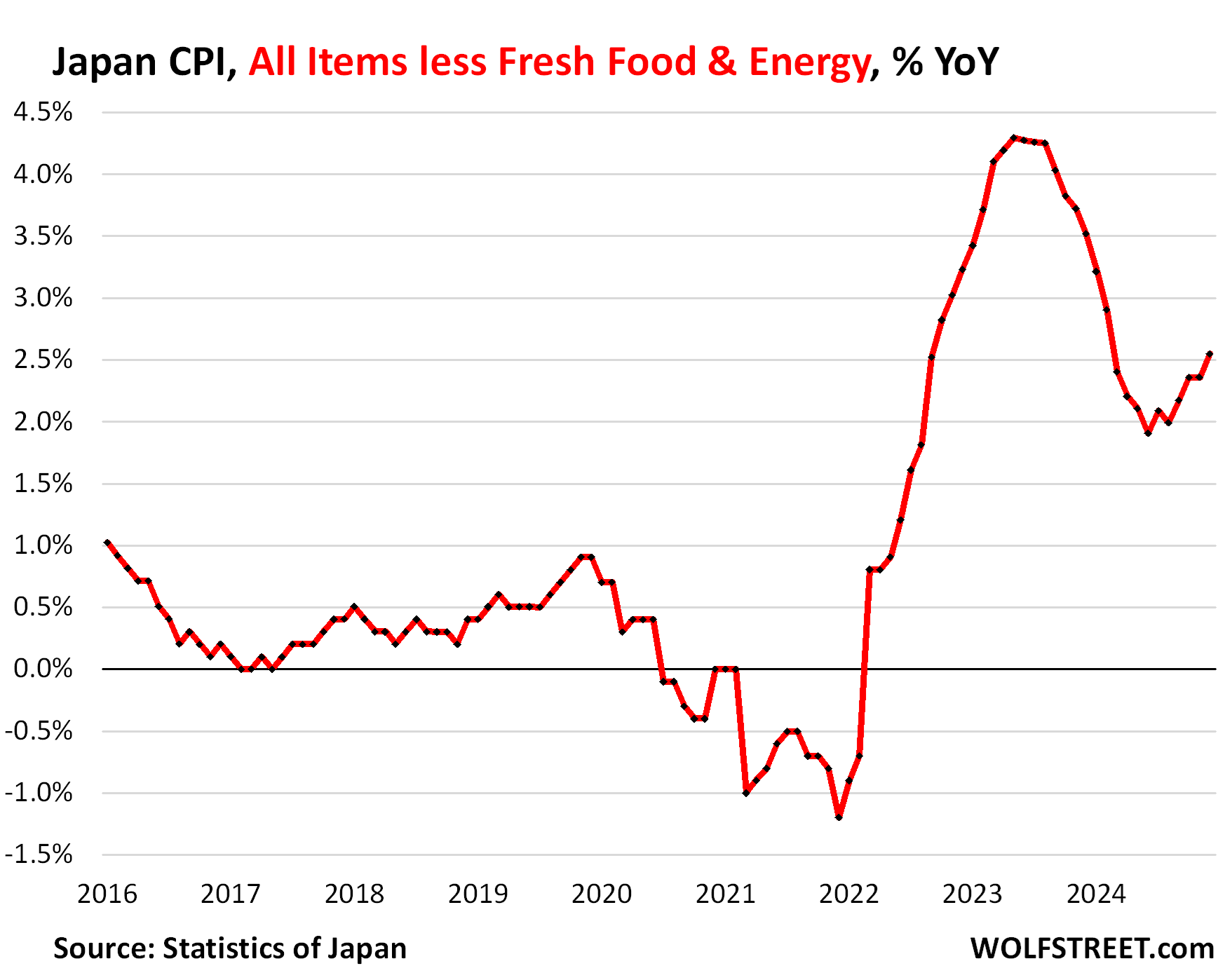The strategy: Let inflation rip to bring the horrible debt-to-GDP ratio down. Households & yield investors pay for it. Turns out, no free lunches after all.
By Wolf Richter for WOLF STREET.
The “all items” Consumer Price Index for Japan surged by 4.02% in January year-over-year, the worst inflation rate since January 2023, and beyond that one month, the worst rate since 1981 (red in the chart).
The all-items CPI minus “imputed rent” – a calculated figure derived from other indicators – spiked to 4.6%, according to Statistics Japan on Friday (blue).

Fresh food prices soared by 7.8% year-over-year, driven by prices of fresh good, +22%, including +25.6% for vegetables and seaweeds and +22.6% for fresh fruits. Inflation in fresh foods has been bad since early 2022.
Japanese households devote a relatively large share of their spending to food, a far higher share than any other country in the G7, based on the Engel coefficient, according to the Nikkei last November. So this hurts:

Energy prices soared by 10.8% year-over-year, with electricity soaring by 18.1% and gas to the home up by 6.2%:
This includes electricity, manufactured & piped gas, liquefied propane, kerosene (used in common household space heaters), and gasoline.

Core CPI – the all-items CPI minus fresh food – accelerated to 3.2%, the worst since June 2023.
Excluding both fresh food and energy, inflation rose by 2.6%. This is a key metric for the Bank of Japan’s 2% inflation target.

The Bank of Japan has raised its policy rate three times to a whopping 0.5%, starting from -0.1%. And it indicated that it would raise rates further in baby steps. The BOJ also started QT in 2024 and is accelerating it in 2025, but it’s a slow process, and its balance sheet is gigantic.
With the BOJ’s policy rate at 0.5% and the 10-year yield of Japanese Government Bonds (JGBs) at 1.34% currently, investors in fixed income products are getting eaten alive on a daily basis by this 4.0% inflation.
By contrast, in the US, CPI is at 3.0% (Japan is at 4.0%), while the midpoint of the Fed’s policy rates is 4.33%, and the 10-year Treasury yield is at 4.5%, still compensating investors for inflation plus some.
But Japan’s long-run fiscal mess, with a debt-to-GDP ratio of 254% in 2024, is more than twice as terrible as the US fiscal mess with a debt-to GDP ratio of 122%.
The Bank of Japan is clearly trying to resolve Japan’s sovereign debt problem, the biggest in the developed world, by fueling inflation to devalue that debt — along with everything else denominated in yen.
And it’s working in its insidious way: Under the impact of this inflation, the debt-to-GDP ratio has been edging lower, from the peak of 260% in 2022. Turns out, there are no free lunches after all, someone is going to pay for it, and it’s the Japanese households, through much higher prices and steeply negative “real” yields on their yield investments. But after decades of reckless government profligacy, there really aren’t many alternatives left to deal with it.
Enjoy reading WOLF STREET and want to support it? You can donate. I appreciate it immensely. Click on the mug to find out how:
![]()


Japan will need to de-index its pensions, otherwise the adjustment will fall heavily onto the working age population and those with money in the postal savings system. People with more flexible investments will move them into stocks and foreign bonds.
If the BoJ is running QT instead of continuing to monetize then interest rates will naturally rise.
Things could quickly get out of hand. Next big upleg in the USD vs the Yen incoming?
Does Japan index its pensions?
I don’t think the kokuminnenkin pension is indexed at all. The only change I know of is a small change of a couple of hundred yen passed on to people this year as a result of some efficiency change. That is the first change I’ve seen in the last 9 years or so
And as far as food and fresh vegetable prices are concerned those prices are a reflection of the bad weather Japan has had over the past couple of years. Not a thing the BOJ can do with interest rates to control the weather.
Even the price of rice has gone up as a result of a bad harvest. Once (if ??) Japan has normal growing season and harvest those fresh vegetable and fruit prices will go down a lot.
Really? Just the weather .
Prices have been rising steadily across all fronts for some time now.
It’s always just the weather or some such thing. Just transitory.
By de-index are you suggesting removal of a cost of living adjustment?
Yes
Consolidated debt tells a much different story. US isn’t in such good relative shape after all.
I wonder if we’ll see 2% on the 10y JGB before the end of the year. Wouldn’t surprise me. How long an the BoJ sit by and watch their currency tank?
You might have to change your handle to ShortJGB !
With BOJ letting its holding run off and Japanese government continuing to borrow it should go up, right?
And one way to please Trump would be to strengthening the yen. So maybe they could accelerate the rate hikes? But probably too much to hope for. BOJ is so slow…
My Wasabi tubes that I buy every week have gone up in price. Now $3.29 for a small tube. You ought to try the hot version. It will tear you apart.
Have a look at the ingredients. The Wasabi tubes I look at here are mostly horseradish (for flavor) and peas (for color) with only some wasabi in it. The amount of wasabi in it make it better or worse, in my book. You can buy fresh wasabi root, grown in the US, and grind it yourself. It’s very good, but expensive, and we don’t do it for that reason, and stick to the tubes (those with more wasabi).
The Wasabi lobby should stop this kind of fraud! 😂
in a restaurant I once took a small spoon of wasabi thing it was quacamole,,,had to run to washroom
thinking it was quacamole
‘Guacamole’..
Based on this article, whack-a-mole
“Turns out, there are no free lunches after all, someone is going to pay for it, and it’s the Japanese households, through much higher prices and steeply negative “real” yields on their yield investments.”
(Speaking more of the US than Japan (whose internal political history and dynamics I am less familiar with))…
Conservatives have been warning about this for *decades* – but the Keynesians/MMT’ers/bureaucratic Statists perpetually pooh-pooh’ed the inescapable consequences of perpetual deficit financing (both fiscal and merchandise trade) and their flying monkey minions in the MSM studiously strangled any honest discussion of this dangerous situation in its crib.
For decades.
Not to let the Republicans off the hook – while talking a good game, in historical practice they have proven themselves to be little more than simply a different Mafia servicing a different set of profiteering fiscal vampires.
And, were it not for the independent channel of the Internet, all the b*stards would be unchallenged still.
cas,
Keynesian theory, I always thought….was to use deficit funding in bad times to improve things and then set aside money in flush times for that very purpose. It does not mean deficits and tax reductions in good times as well as bad times. But when you use printed money to buy votes…….
Paul S-
“In theory there is no difference between theory and practice. In practice there is.”
— Yogi Berra
Firing a lot of the IRS won’t help
The IRS should be abolished. There should be zero income tax.
Good luck with that…
I agree, or simplify it radically. At this point it’s insane complexity is gamed by the rich and the criminally minded.
So how do we file all the concerns about the national debt?
I don’t think the USA national debt will go down, au contraire. We face a reckoning (we are told), so it must fall on Medicaid or zillionaires, neither of which is me. But I suspect I will be handed a dinner check somehow.
They will send you a bill, separately, for your part.
Just FYI, conservatives have been running Japan as majority party from 1955 to 1993 and they only lost to centrists yet still maintained power through minority control from 1993 to about 2007. Ever since, it’s still been in conservative control in Japan.
Highly unlikely that the Bank of Japan make significant rate increases, because of two reasons: 1.) to ease the debt burden here the interest rate payments, and 2.) inflate the debt away. Japan is actually the test balloon for financial repression, and i´m sure other countries monitoring this intensive.
Lenin once proclaimed that he could destroy capitalists and capitalism by debauching the currency.
Why does the Japanese population buy Japanese bonds that are sure to lose value after inflation and taxes?
If the answer is nationalism, it’s a carry traders dream come true. Citizens will suffer so that speculators have their way.
From a broader perspective, why does interest rate suppression work in any country? I’d argue it requires a high level of deception from central bankers. Advertised inflation targets must be set lower than what can actually be achieved in a full employment setting.
I don’t think that JGBs are widely held by households. Over half are held by the BOJ. government-controlled institutions, such as pension funds, hold a bunch. Banks hold a bunch because they have to. The partially privatized Japan Post Bank holds a bunch. Etc.
But back when there was little or now inflation, JGBs weren’t such a bad deal. Now they are.
Mr. Richter,
Is there any way to tell if Japanese households actually own Japanese fixed income assets at scale? And if not households, who owns them?
The phenomenon of middle class Japanese citizens buying foreign assets at scale to avoid their negative domestic yields is somewhat infamous, but I have no idea as to the scale of this.
https://www.mof.go.jp/english/index.htm
Go down to the monthly newsletter
Boj 53%
Insurance 18%
Banks 12%
Foreign 7%
Public pension 6%
Households 1%
There is an interesting paper here showing how Japan is not in as much trouble as it appears due to its large asset position.
https://www.stlouisfed.org/on-the-economy/2023/nov/what-lessons-drawn-japans-high-debt-gdp-ratio
Presumably if JP rates rise they can redeem their high yielding US treasury holdings to pay off their currently very low yielding liabilities.
Not sure I follow that completely, but if someone from the Fed published that they understand it better than I do.
Very good info
Wolf – always appreciate your periodic observations of Japan’s situation, especially given in the light that you’ve said it’s rarely ‘top of the pops’, here…
may we all find a better day.
I’m doubting it, but does Japan have anything similar to TIPS?
The US 10-year
I wonder what the world economy would look like if Japan had to hike its interest rates to 4 or 5%. Pandemonium?
DM: Nissan (Datsun) America’s No 5 carmaker faces extinction after Moody’s ‘junk’ rating
Nissan is facing tough times. The Japanese automaker, already reeling from failed merger talks with Honda, just suffered another blow.
Moody’s this morning downgraded its credit rating to ‘junk’ status, citing weak profitability and an aging vehicle lineup.
A junk credit rating signals to investors that lending money to Nissan is now considered a very risky bet.
In turn, the company, which sold the fifth most cars in the U.S. in 2024, will likely have to pay higher interest rates to borrow money.
The downgrade comes at a particularly challenging time for Nissan. Last November, the company unveiled a restructuring plan that would slash 9,000 jobs and cut production by 20 percent.
At the time, executives told the Financial Times that the company only had enough cash to survive until the end of 2025.
And just last Thursday, its potential lifeline — a merger with a more stable Japanese automaker, Honda — fell apart less than two months after being announced.
DM exaggerates to get clicks. Lots of good companies have “junk” credit ratings, it just means that their leverage is higher.
What actually happened is that Moody’s cut Nissan’s senior unsecured bond rating by one piddly notch, to Ba1 (highest “junk” rating) from Baa3 (lowest investment grade rating). It can still sell lots of unsecured bonds with a Ba1 credit rating. And if the market loses interest, it can sell secured bonds. There is now so much demand for bonds out there, it’s unbelievable, and spreads are ultra-tight, amid loosey-goosey financial conditions.
Here is my cheat sheet for corporate credit ratings by ratings agency:
https://wolfstreet.com/credit-rating-scales-by-moodys-sp-and-fitch/
That downgrade doesn’t change much for Nissan. But Nissan has some real problems, including sales in the US:
Has had big probs with CVT with 6% failing during warranty.
1:04 PM 2/21/2025
Dow 43,428.02 -748.63 -1.69%
S&P 500 6,013.13 -104.39 -1.71%
Nasdaq 19,524.01 -438.36 -2.20%
VIX 18.64 2.98 19.03%
Gold 2,948.70 -7.40 -0.25%
Oil 70.30 -2.27 -3.13%
How’s your gold price prediction going?
Not so well I see.
Look for more huge gains in price as people try to get out of all the short bets and trying to buy back gold to end leases as the COMEX becomes Basel III compliant on 1 July 2025.
How high will it go?
$3500 to $5000 an ounce?
Of course the BOJ was going to inflate down their sovereign debt issues. As Wolf points out, someone pays (savers) but its to impose on the public than elevated taxes.
Interestingly, we went through our own political movements over whether to inflate out debt. Cross of Gold? Back when fiat paper currency was a lol, no, there was a big dust up over whether to base the currency on silver as well, which would have been inflationary.
The state fault lines looked very different. Some folks might have ancestors on the other side of the issue. Seems like everyone talks their book, at the end.
Yen was near 158 at the start of the year, now down to 149. There’s still time to get some vacations to Japan before that great exchange rate goes away. I was amazed by how affordable Tokyo was, a sentence I never thought I’d say in my lifetime. I’m no currency expert but with the baby rate hikes, does that mean the currency will stay cheap relative to the dollar for some time?
So much poor “conventional wisdom” in so many comments about Japan. I recommend visiting the place to see for oneself what this “dire” economy and “raging” inflation actually looks like. On seeing the on-the-ground “consequences”, one might go return to one’s Fentanyl and stupid-politics-ravished US quite jealous if one did!
Yes, there are bad things here. I’ve only received about a 6% salary rise in all my time here (three annual 2% increases, as “requested” by the government as a “target”) but I’m not really here for only money. I don’t own a home here, but most mortgage rates are typically under 2%.
Yes, food prices have jumped, but where haven’t they, really, and if you have some time to shop around, you can still find bargains that simply don’t exist in my home country of USA anymore. To take a “hot topic” in the US, egg prices here have “soared” to…1.80 USD per 10 pack. “Crushing”, right? Rice! is up 70%. Now that irks the rice-obsessed Japanese to no end, me less so because of all the fantastic varieties of CHEAP, quality, fresh bakery options one simply cannot widely find in the US anymore.
Meanwhile, rents have barely changed in 25 years (my rent for a 12 year stay in a central Tokyo apartment hasn’t increased once; at current exchange rates it costs $600. 10th floor, three rooms and a kitchen, with washing machine on the balcony overlooking a great view of Mt. Fuji in the distance. Small, but not shockingly so. Seems the landlady is happy enough with steady, timely payments.) And my personal health insurance, for both medical and full dental, is a whopping 45 USD per month.
So, what do you think? How “badly” am I suffering over here? The good balances out the bad, right? Barely any homeless, world class service, no mass drug problems, highly educated and mostly apolitical, friendly locals, city crime almost non-existent in the world’s largest metropolis and the longest life expectancy in the world, with REAL food instead of the often reheated slop I find in so many US restaurants these days. I’m…staying put. (While investing in the US markets and bonds, naturally, another mitigator of the supposed economic “malaise” we’re experiencing here). Sorry for ranting, but just for some “on-the ground” perspective, as it were…Thanks, Wolf.
1. Prices in Japan are low in dollar-terms because the yen has collapsed. In dollar terms — and you cite dollar prices — everything in Japan is extremely cheap due to the collapse of the yen. But for people who earn their income in yen, that’s not the case.
2. Seems you haven’t read any of the comments, and you’re just getting stuff off your chest because you saw “Japan” in the headline.
I remember traveling in Japan when the Yen was 100 yen per dollar. Everything was relatively expensive! The Japanese people are big time stackers of gold as a way of preserving buying power. Perhaps printing huge amounts of low value Yen to buy a tier one asset is not such a bad idea. Is the BOJ in on it? This could partially explain the low inventory levels of physical gold being reported at all of the major exchanges.
Precious Metals Mining shares have gone up dramatically.
No, there are not any free lunches. Though in a world of fiat currency, there sure seems to be the ability to constantly kick the can down the road for all involved….which is…..everyone.
Yes,
Despite all the Japan bashing her there are a lot of things about Japan that are much better than in the USA and other countries. There are also a lot of things that aren’t so good either.
Housing costs compared to the USA are quite varied and range from sky high prices in high rise condos in the big cities to ridiculously low prices in the smaller towns and cities. Rents are very reasonable for average properties as well. Property taxes compared to the US are low too.
And as you stated mortgage rates are very low allowing people to actually buy a property.
Vegetable and rice prices have soared recently and just like every other country in the world will fall when normal harvests return. That’s real world econonomics.
Unfortunately, two areas that makes Japan a bad place to live are low pensions and inheritance taxes.
As a result of low pensions in old age people in Japan are forced to save or they won’t be able to have a decent life when they retire. Given the low interest rates on savings that in turn requires more savings.
As far as inheritance taxes are concerned there are going to be a lot of foreigners that end up in a bad situation.
Many foreigners and there children will end up paying a huge amount of inheritance taxes to Japan just for the privilege of living there or having lived there, but may not have anything to do with Japan.
If you have Permanent residency, are on a spouse visa, or have been in Japan for a certain period of years you are subject to Japanese inheritance taxes on your estate and any inheritance you receive regardless of where those assets are held.
And if you leave Japan and once you meet the above requirements you are still subject to those taxes for a period of years after leaving.
Foreign survivors pensions are also subject to inheritance taxes and the taxable amount is based on the total future value calculated on life expectancy regardless of the fact that the survivor may not have received any of the pension or dies early.
Oh, and by the way…
If you make more than 20 million yen you have to list all your assets when you file your tax return and if you have foreign assets of over 50 million yen those have to be listed and given to the tax agency as well.